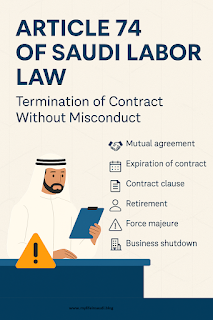How to Resign Legally in Saudi Arabia – A Complete Guide for Expats

Resigning from a job is a significant decision, especially when you're working in a foreign country like Saudi Arabia. Whether you're an expat or a local employee, it's essential to follow the proper legal procedure to ensure your resignation is valid, smooth, and does not harm your future employment opportunities or legal status in the Kingdom. In this detailed guide, we’ll walk you through how to resign legally in Saudi Arabia , covering notice periods, legal rights, final settlements, and the dos and don’ts according to the Saudi Labor Law . 1. Understand Your Employment Contract Before resigning, the first step is to review your employment contract . Your contract outlines key terms such as: Type of contract (fixed-term or unlimited) Notice period requirements Penalties for breach of contract End of service benefits eligibility According to Saudi Labor Law , the contract governs much of the resignation process, so understanding what you signed is cru...






